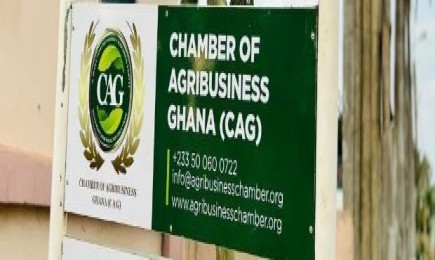The Ghana Voice,
Accra, Ghana

Chamber of Agribusiness Ghana Urges Sector-Wide Price Cuts, Calls for Bold Government Action to Curb Soaring Food Costs
The Ghana Voice 05-08-2025The Chamber of Agribusiness Ghana (CAG) is calling for a nationwide, coordinated reduction in food prices across the entire agribusiness value chain in a bold appeal to safeguard national food security, protect public health, and restore economic stability.
In a strongly worded statement issued , the Chamber urged all players across the agricultural and agro-industrial sectors—including input suppliers, aggregators, food retailers, and transport operators—to reassess their pricing structures and reduce margins in response to Ghana’s growing food affordability crisis.
“Ghana’s food system is under immense strain,” said Anthony Morrison, CEO of the Chamber. “Food prices have reached levels that are eroding purchasing power, pushing healthy diets out of reach for millions, and threatening the country’s long-term food security.”
Rationale for Price Realignment
CAG’s statement outlined multiple critical reasons for the urgent call to action:
-
Preventing Malnutrition and Public Health Crisis: High food prices have forced consumers, particularly in low-income households, to turn to cheaper, nutrient-poor foods. This dietary shift is fueling rising rates of malnutrition, micronutrient deficiencies, and non-communicable diseases (NCDs).
-
Sustaining Farmer Viability: The Chamber noted that high post-farmgate margins and input costs discourage production. Many farmers are either reducing cultivation, using fewer inputs, or abandoning farming altogether. Lower prices at the consumer end, achieved through efficient cost management across the chain, are necessary to sustain farmer profitability.
-
Fighting Inflation: As food makes up a significant portion of the Consumer Price Index (CPI), high food inflation is a key driver of overall economic instability, wage erosion, and interest rate hikes. Lower food prices, CAG argues, are the quickest route to calming inflationary pressures.
-
Stimulating the Broader Economy: When households spend most of their income on food, demand for other goods declines, further depressing the economy. Affordable food, the Chamber emphasized, will restore consumer confidence and spending across sectors.
-
Reducing Waste and Driving Innovation: High retail prices often conceal inefficiencies. A sector-wide effort to reduce prices would also encourage innovation, cut operational waste, and improve logistics and supply chain performance.
Urgent Demands to Government
While calling on the private sector to act responsibly, the Chamber placed significant responsibility on the government to address systemic challenges and create an enabling environment for price reductions to succeed. Key demands include:
-
Tackling Input Costs: Implement transparent, digital input subsidy schemes using e-vouchers, and boost local fertilizer and seed production to reduce foreign exchange exposure.
-
Reducing Post-Harvest Losses: Increase investment in modern storage infrastructure and promote affordable post-harvest technologies to reduce the estimated 30–50% of food lost after harvest.
-
Improving Transportation and Logistics: Rehabilitate feeder roads, enforce axle load limits, modernize trucking fleets, and invest in rail systems to lower food transport costs.
-
Expanding Access to Finance: Scale up programs like GIRSAL and introduce affordable, risk-mitigated lending options for agribusinesses, especially SMEs.
-
Fixing Market Coordination Failures: Develop real-time mobile-accessible market information systems, and support structured contract farming models to enhance price transparency and reduce waste.
A National Imperative
“This is a shared responsibility,” Morrison emphasized. “Our appeal is not just economic—it is a moral imperative to preserve lives, livelihoods, and the future of our agricultural economy.”
The Chamber warned that without bold and immediate action by both private and public stakeholders, the country risks deepening its food insecurity crisis, undermining public health, and stalling broader economic recovery.
